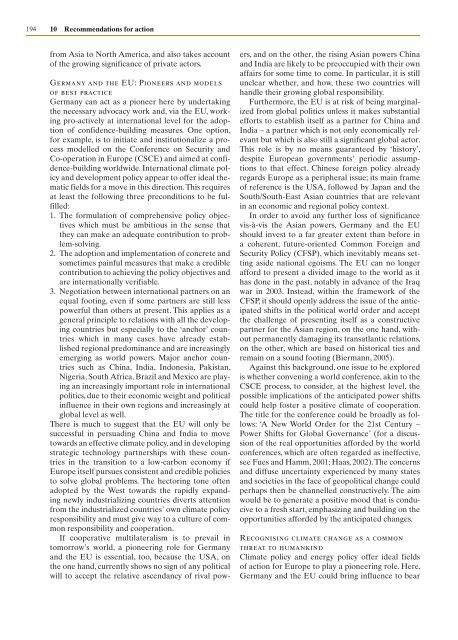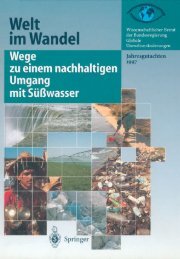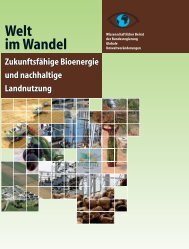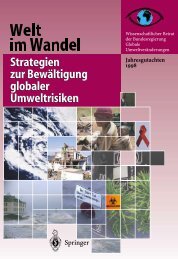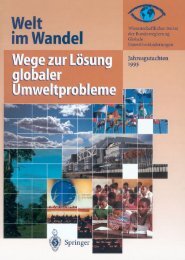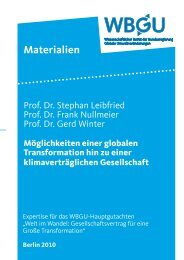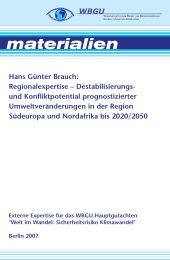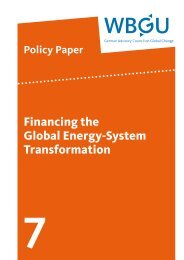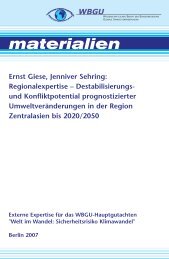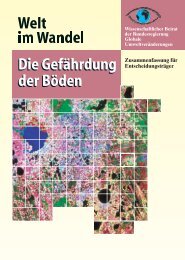World in Transition: Climate Change as a Security Risk - WBGU
World in Transition: Climate Change as a Security Risk - WBGU
World in Transition: Climate Change as a Security Risk - WBGU
Create successful ePaper yourself
Turn your PDF publications into a flip-book with our unique Google optimized e-Paper software.
194 10 Recommendations for action<br />
from Asia to North America, and also takes account<br />
of the grow<strong>in</strong>g significance of private actors.<br />
Germany and the EU: Pioneers and models<br />
of best practice<br />
Germany can act <strong>as</strong> a pioneer here by undertak<strong>in</strong>g<br />
the necessary advocacy work and, via the EU, work<strong>in</strong>g<br />
pro-actively at <strong>in</strong>ternational level for the adoption<br />
of confidence-build<strong>in</strong>g me<strong>as</strong>ures. One option,<br />
for example, is to <strong>in</strong>itiate and <strong>in</strong>stitutionalize a process<br />
modelled on the Conference on <strong>Security</strong> and<br />
Co-operation <strong>in</strong> Europe (CSCE) and aimed at confidence-build<strong>in</strong>g<br />
worldwide. International climate policy<br />
and development policy appear to offer ideal thematic<br />
fields for a move <strong>in</strong> this direction. This requires<br />
at le<strong>as</strong>t the follow<strong>in</strong>g three preconditions to be fulfilled:<br />
1. The formulation of comprehensive policy objectives<br />
which must be ambitious <strong>in</strong> the sense that<br />
they can make an adequate contribution to problem-solv<strong>in</strong>g.<br />
2. The adoption and implementation of concrete and<br />
sometimes pa<strong>in</strong>ful me<strong>as</strong>ures that make a credible<br />
contribution to achiev<strong>in</strong>g the policy objectives and<br />
are <strong>in</strong>ternationally verifiable.<br />
3. Negotiation between <strong>in</strong>ternational partners on an<br />
equal foot<strong>in</strong>g, even if some partners are still less<br />
powerful than others at present. This applies <strong>as</strong> a<br />
general pr<strong>in</strong>ciple to relations with all the develop<strong>in</strong>g<br />
countries but especially to the ‘anchor’ countries<br />
which <strong>in</strong> many c<strong>as</strong>es have already established<br />
regional predom<strong>in</strong>ance and are <strong>in</strong>cre<strong>as</strong><strong>in</strong>gly<br />
emerg<strong>in</strong>g <strong>as</strong> world powers. Major anchor countries<br />
such <strong>as</strong> Ch<strong>in</strong>a, India, Indonesia, Pakistan,<br />
Nigeria, South Africa, Brazil and Mexico are play<strong>in</strong>g<br />
an <strong>in</strong>cre<strong>as</strong><strong>in</strong>gly important role <strong>in</strong> <strong>in</strong>ternational<br />
politics, due to their economic weight and political<br />
<strong>in</strong>fluence <strong>in</strong> their own regions and <strong>in</strong>cre<strong>as</strong><strong>in</strong>gly at<br />
global level <strong>as</strong> well.<br />
There is much to suggest that the EU will only be<br />
successful <strong>in</strong> persuad<strong>in</strong>g Ch<strong>in</strong>a and India to move<br />
towards an effective climate policy, and <strong>in</strong> develop<strong>in</strong>g<br />
strategic technology partnerships with these countries<br />
<strong>in</strong> the transition to a low-carbon economy if<br />
Europe itself pursues consistent and credible policies<br />
to solve global problems. The hector<strong>in</strong>g tone often<br />
adopted by the West towards the rapidly expand<strong>in</strong>g<br />
newly <strong>in</strong>dustrializ<strong>in</strong>g countries diverts attention<br />
from the <strong>in</strong>dustrialized countries’ own climate policy<br />
responsibility and must give way to a culture of common<br />
responsibility and cooperation.<br />
If cooperative multilateralism is to prevail <strong>in</strong><br />
tomorrow’s world, a pioneer<strong>in</strong>g role for Germany<br />
and the EU is essential, too, because the USA, on<br />
the one hand, currently shows no sign of any political<br />
will to accept the relative <strong>as</strong>cendancy of rival pow-<br />
ers, and on the other, the ris<strong>in</strong>g Asian powers Ch<strong>in</strong>a<br />
and India are likely to be preoccupied with their own<br />
affairs for some time to come. In particular, it is still<br />
unclear whether, and how, these two countries will<br />
handle their grow<strong>in</strong>g global responsibility.<br />
Furthermore, the EU is at risk of be<strong>in</strong>g marg<strong>in</strong>alized<br />
from global politics unless it makes substantial<br />
efforts to establish itself <strong>as</strong> a partner for Ch<strong>in</strong>a and<br />
India – a partner which is not only economically relevant<br />
but which is also still a significant global actor.<br />
This role is by no means guaranteed by ‘history’,<br />
despite European governments’ periodic <strong>as</strong>sumptions<br />
to that effect. Ch<strong>in</strong>ese foreign policy already<br />
regards Europe <strong>as</strong> a peripheral issue; its ma<strong>in</strong> frame<br />
of reference is the USA, followed by Japan and the<br />
South/South-E<strong>as</strong>t Asian countries that are relevant<br />
<strong>in</strong> an economic and regional policy context.<br />
In order to avoid any further loss of significance<br />
vis-à-vis the Asian powers, Germany and the EU<br />
should <strong>in</strong>vest to a far greater extent than before <strong>in</strong><br />
a coherent, future-oriented Common Foreign and<br />
<strong>Security</strong> Policy (CFSP), which <strong>in</strong>evitably means sett<strong>in</strong>g<br />
<strong>as</strong>ide national egoisms. The EU can no longer<br />
afford to present a divided image to the world <strong>as</strong> it<br />
h<strong>as</strong> done <strong>in</strong> the p<strong>as</strong>t, notably <strong>in</strong> advance of the Iraq<br />
war <strong>in</strong> 2003. Instead, with<strong>in</strong> the framework of the<br />
CFSP, it should openly address the issue of the anticipated<br />
shifts <strong>in</strong> the political world order and accept<br />
the challenge of present<strong>in</strong>g itself <strong>as</strong> a constructive<br />
partner for the Asian region, on the one hand, without<br />
permanently damag<strong>in</strong>g its transatlantic relations,<br />
on the other, which are b<strong>as</strong>ed on historical ties and<br />
rema<strong>in</strong> on a sound foot<strong>in</strong>g (Biermann, 2005).<br />
Aga<strong>in</strong>st this background, one issue to be explored<br />
is whether conven<strong>in</strong>g a world conference, ak<strong>in</strong> to the<br />
CSCE process, to consider, at the highest level, the<br />
possible implications of the anticipated power shifts<br />
could help foster a positive climate of cooperation.<br />
The title for the conference could be broadly <strong>as</strong> follows:<br />
‘A New <strong>World</strong> Order for the 21st Century –<br />
Power Shifts for Global Governance’ (for a discussion<br />
of the real opportunities afforded by the world<br />
conferences, which are often regarded <strong>as</strong> <strong>in</strong>effective,<br />
see Fues and Hamm, 2001; Ha<strong>as</strong>, 2002). The concerns<br />
and diffuse uncerta<strong>in</strong>ty experienced by many states<br />
and societies <strong>in</strong> the face of geopolitical change could<br />
perhaps then be channelled constructively. The aim<br />
would be to generate a positive mood that is conducive<br />
to a fresh start, emph<strong>as</strong>iz<strong>in</strong>g and build<strong>in</strong>g on the<br />
opportunities afforded by the anticipated changes.<br />
Recognis<strong>in</strong>g climate change <strong>as</strong> a common<br />
threat to humank<strong>in</strong>d<br />
<strong>Climate</strong> policy and energy policy offer ideal fields<br />
of action for Europe to play a pioneer<strong>in</strong>g role. Here,<br />
Germany and the EU could br<strong>in</strong>g <strong>in</strong>fluence to bear


